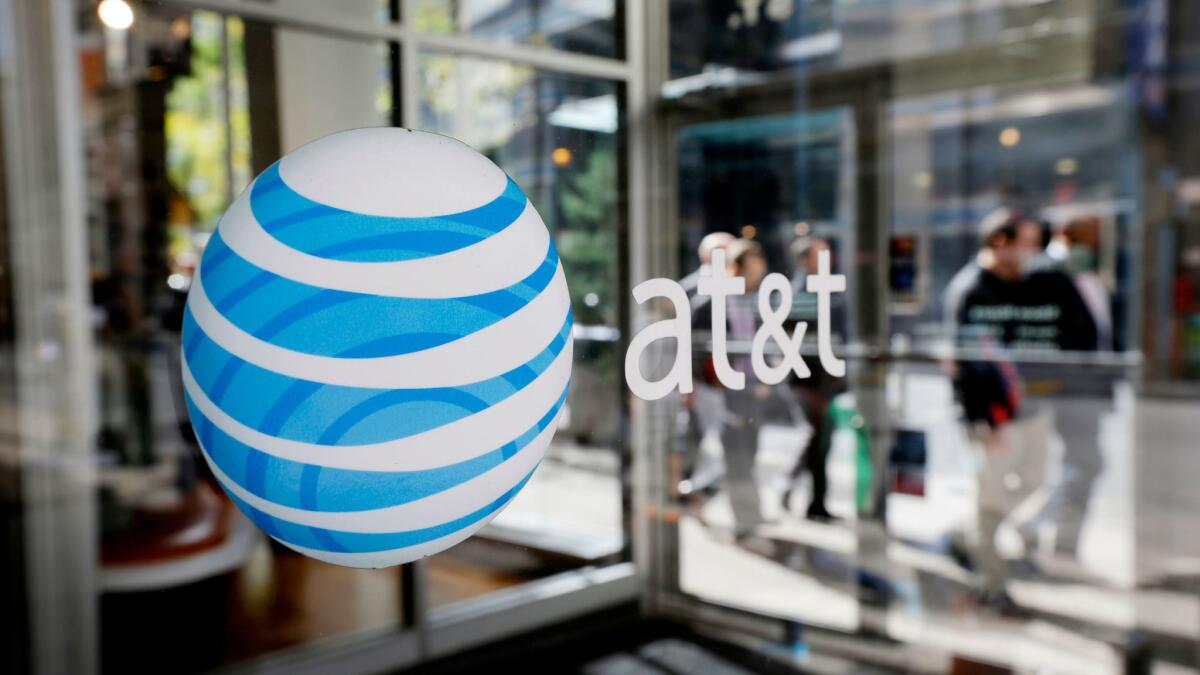Editorial: AT&T’s data-free TV offer poses a net neutrality problem

AT&T Wireless recently offered its customers a compelling freebie: If they subscribe to DirecTV, the satellite TV service that AT&T acquired in 2015, or DirecTV’s new slimmed-down online offering, they can watch an unlimited amount of TV on their mobile devices without using up any of their monthly data allotment. That seems like a great deal for consumers, at least in the short run. But the Federal Communications Commission worries that AT&T is tilting the online playing field in a way that violates federal net neutrality rules. And it’s right to be concerned.
The rules flatly prohibit broadband Internet service providers such as AT&T and Comcast from blocking or slowing down content and services on their networks, and from prioritizing delivery of content for a fee. To further assure a level playing field, they also include a “general conduct standard” ordering broadband providers not to “unreasonably interfere with or unreasonably disadvantage” Internet content, service or app providers or their customers.
Critics say AT&T is using data charges and caps to tilt the playing field and violate the general conduct standard. Under its “sponsored data” program, a website or service — such as DirecTV’s online TV service, called DirecTV Now — can pay AT&T to cover the data charges that AT&T’s customers incur when streaming the site’s content. Presumably, that makes those sites or services videos more attractive to consumers than competing outlets that don’t pay for sponsored data, particularly for consumers worried about using up monthly data allotments that aren’t large enough for mobile bingeing. The tilt seems especially pronounced in favor of DirecTV, because the sponsored data fees it incurs are not hurting the corporate bottom line — the money simply moves from one AT&T pocket to another.
That’s why the FCC challenged AT&T’s sponsored data program in a letter sent earlier this month. (It started a similar informal inquiry into Verizon’s new sponsored-data program on Thursday.) The data charges that DirecTV’s competitors would have to pay in cash to AT&T could be so high, it could be impossible for them to compete with DirecTV’s $35-a-month online offering, warned Jon Wilkins, chief of the FCC’s wireless bureau.
Yet the issue is not black and white. What AT&T is doing with DirecTV is good for competition both in mobile phone service and cable TV, offering consumers new features and a new mobile alternative to their local cable operator. And there is precedent for how AT&T is handling DirecTV’s streams: Back in the day of tightly regulated Bell telephone companies, the FCC allowed subsidiaries of those local monopolies to offer services through the parent company’s network as long they did so on the same terms offered to everyone else. That’s what AT&T is doing now, albeit without the price caps and cost accounting of yore. In addition, the money generated by the sponsored data program can help pay for network upgrades and extra capacity, although the program creates a perverse incentive in the opposite direction: It generates money only when there are restrictive data caps and a threat of congestion.
Nevertheless, AT&T’s approach remains problematic. The Internet shouldn’t have gatekeepers, even ones that treat competing companies fairly. And the sponsored data charges look like gatekeeping. Prior to the launch of that program, all the traffic entering AT&T’s network was on equal footing, whether it was sent from a Hollywood studio or an amateur filmmaker on YouTube. With sponsored data, a clear advantage goes to content from companies that can afford to pay the freight. That’s why it isn’t sufficient just to require ISPs to impose the same conditions on all content and services — they shouldn’t be allowed to grant any kind of advantage (or disadvantage) to legal content as it travels across their networks.
There are plenty of ways for AT&T to use its mobile-phone and pay-TV services to promote competition that do not involve acting as a gatekeeper for online content. For example, it could take a page from T-Mobile’s playbook and simply waive the data charges for any video streamed in a compact, mobile-friendly format.
The FCC’s strictures may not last long in the Trump administration; the president-elect’s transition team includes three vocal opponents of net neutrality regulation. The two Republicans on the commission also oppose the rules strongly — as do Republicans in Congress — because they consider them unnecessary to protect competition online, and because innovation on the Internet has thrived in the absence of government involvement.
But President-elect Trump was critical during the campaign of consolidation in the media industry, and what AT&T is doing with DirecTV illustrates the good and bad implications of such deals. At the very least, the FCC has to assure that AT&T’s sponsored data fees won’t pose a hurdle to new companies seeking to compete with DirecTV online. Otherwise, AT&T will be blazing a trail that’s likely to be followed not just by AT&T in its proposed acquisition of Time Warner — a major source of movies and TV programs — but also by the rest of the wireless industry, to the detriment of smaller and more innovative content and service companies online.
More to Read
A cure for the common opinion
Get thought-provoking perspectives with our weekly newsletter.
You may occasionally receive promotional content from the Los Angeles Times.










